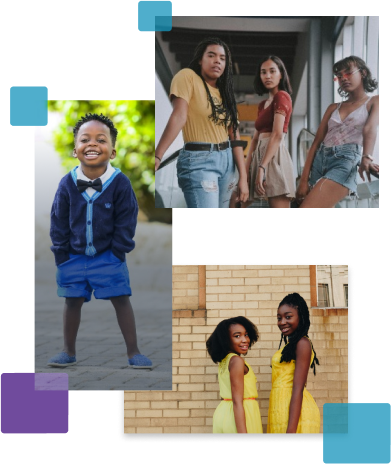
How We Work
We work to champion the rights of girls, fighting punitive treatment in schools; unjust criminalization; adultification bias against Black girls; and gender-based violence and the sexual abuse to prison pipeline for girls. We offer solutions, including restorative practices and other methods make public systems fairer to girls and women.
Our approach is intersectional. We believe that there can be no gender justice without racial equity and no racial justice without gender equity.
We focus on changing the public spaces that touch the lives of girls and gender-expansive youth, to transform systems to achieve justice and allow girls to be truly free.

Within our distinct focus on girls and women:

We believe in an expansive definition and experience of gender, inclusive of those who are non-binary, trans, or who identify or are perceived as girls or women.

We recognize intersectionality across the many identities people hold.

We are inclusive in our language and our approach.

We welcome all who find value, representation, and purpose in our work.

We release widely recognized publications that contribute value to the field and receive significant national media attention; host events that range from webinars to White House conferences to an evening at a national women’s art museum; partnered with government agencies, nonprofit organizations, academic institutions, and girls themselves, to ensure that our work is in alignment with young people’s own articulation of their concerns and priorities.
We prioritize collaboration, especially with women-led organizations. We work across Georgetown campuses and with organizations across the country that are engaged in multidisciplinary work on women’s and girls’ issues, ranging from direct service to national advocacy work.

We value the power of youth voices as an important source of insight and knowledge. In alignment with this core value, we consult with our Youth Advisors, publish artwork by girls to amplify youth perspectives, gather real-world stories that bring our work to life, conduct qualitative research with girls to learn from their insights and lived experiences.
Our overarching concern is to improve public systems’ engagement with youth who identify as girls or gender-expansive, from schools to healthcare to the juvenile justice system. Specifically, we aim to decrease over-discipline, increase access to education and wellness, strengthen responses to trauma, and reduce inappropriate rates of arrests and confinement. Our research projects target the school to prison pipeline for girls; restorative justice as an innovative solution to over-discipline; adultification bias against Black girls; and the unique forms of trauma that girls experience.


